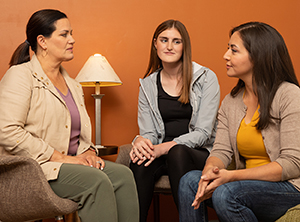Treating Anxiety Disorders with Therapy
If you have an anxiety disorder, you should know it can be treated. Therapy (also called counseling) is often a helpful treatment for anxiety disorders. With therapy, a trained therapist helps you face and learn to manage your anxiety. Therapy can be short-term or long-term. It is based on your needs. In some cases, medicine may also be prescribed with therapy. It may take time before you notice how much therapy is helping. But stick with it. With therapy, you can feel better.
Cognitive behavioral therapy (CBT)
Cognitive behavioral therapy (CBT) teaches you to manage anxiety. It does this by helping you understand how you think and act when you’re anxious. Research has shown CBT to work very well for anxiety disorders. CBT includes homework and activities. These build your skills to cope with anxiety step by step. CBT can be done in a group or one-on-one. It often takes place for a set number of sessions. CBT has two main parts:
-
Cognitive therapy. This helps you identify the negative, irrational thoughts that occur with your anxiety. You’ll learn to replace these with more positive, realistic thoughts.
-
Behavioral therapy. This helps you change how you react to anxiety. You’ll learn coping skills and methods for relaxing to help you better deal with anxiety.
Other types of therapy
Other types of therapy may work better for you than CBT. Or, you may move from CBT to another form of therapy as your treatment needs change. You may meet with a therapist by yourself or in a group. Therapy can also help you work through things such as drug or alcohol dependence. These can make your anxiety worse.

Getting better takes time
Therapy will help you feel better and teach you skills to help manage anxiety long-term. But change doesn’t happen right away. It takes a commitment from you. And treatment only works if you learn to face the causes of your anxiety. So, you might feel worse before you feel better. This can sometimes make it hard to stick with it. But remember: Therapy can be a very effective treatment. The results will be worth it.
Helping yourself
If anxiety is wearing you down, here are some things you can do to cope:
-
See your healthcare provider. They can rule out any physical problems that may cause your anxiety symptoms.
-
Learn more about anxiety disorders. Collect helpful online resources and books you can use during stressful periods.
-
Use stress management methods such as meditation
-
Attend online or in-person support groups.
-
Don’t fight your feelings. The more you worry about anxiety, the worse it can get. Instead, try to find what triggered your anxiety. Then try to put this threat in perspective.
-
Keep in mind that you can’t control everything. Change what you can. Let the rest take its course.
-
Get exercise. It’s a great way to relieve tension. It will help your body feel relaxed.
-
Examine your life for sources of stress. Try to find ways to make changes.
-
Don't use caffeine or nicotine. These can make anxiety symptoms worse.
-
Don't use alcohol or unprescribed medicines for relief. They only make things worse over time.
Online Medical Reviewer:
L Renee Watson MSN RN
Online Medical Reviewer:
Marianne Fraser MSN RN
Online Medical Reviewer:
Paul Ballas MD
Date Last Reviewed:
12/1/2022
© 2000-2025 The StayWell Company, LLC. All rights reserved. This information is not intended as a substitute for professional medical care. Always follow your healthcare professional's instructions.